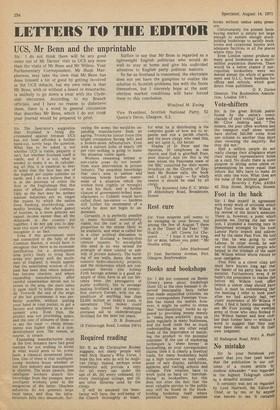Sir: The Spectator's suggestion that Scotland is being discriminated against
because UCS has not been afforded a further hand-out, surely begs the question. What has to be asked is not whether UCS is viable, palpably it isn't, but whether Scotland itself is viable, and if it is not, what is needed to make it so. In calculating all this, it is essential to bear in mind that the Scot has one of the highest per capita subsides on earth, and I do not believe that it is in the interests of either the Scot or the Englishman that this state of affairs should continue. Ugly as the fact may be, archaic manual industries are no longer the means by which the nation lives. Banking, stockbroking, commodity broking, the whole gamut of tourism, is a more genuine net export income earner than all the shipyards in the country put together. I do not ask you to applaud this state of affairs, merely to recognize it as fact. Even if this government were not committed to the folly of the Common Market, it would have to recognize that there is no economic justification for a development area policy likely to bring those areas into parity with the southeast of England. It would appear that the established wiscir,m of the past has been that where industry has become obsolete, and where expanding manufacturers, after careful examination decide not to invest in the area, the state takes it upon itself to bribe them so to do. Towards the end of the reign of the last government it was perfectly possible, without putting your hand in your pocket, to get a factory and machinery in a development area. Even then, the project was not proceeding apace, and the rate of closures of these — to say the least — cheap invest ments was higher than in a nondevelopment area. The reason, of course, is simple.
Expanding manufacturers must in the first instance have had good reasons for not wishing to invest in what would seem to be, prima facie, a classical investment situa tion. One of them is that intelligent young workers know whether or not their industry and management is obsolete. The more passive, less intelligent workers absorb this knowledge from the younger, more intelligent workers, prior to the emigration of the latter. Obsolete industries do not generate large local taxes, and thus the infrastructure falls into desuetude. Sur veying the scene, the would-be expanding manufacturer finds an ageing, Trotokyite labour force (the bright youngsters having left) and a broken-down infrastucture. Even with a subvert bribe of nearly 100 per cent nothing is going to make the situation viable again.
Workers remaining behind in non-viable areas do not benefit from state intervention in private industry. The unspoken knowledge that one's area is useless and valueless breeds further resentment of a situation which the worker feels (rightly or wrongly) is not his fault, and a further closure of government-bribed manufacturers .— Cobbett would have called them tax-eaters — hardens still further his resentment of a world he does not begin to understand.
Certainly, it is perfectly possible to make Scotland economically viable, but the cost is out of all proportion to the return likely to be available, and what is called for is a clear political discussion to create of Scotland a twenty-first century country. To accomplish this need in no way extend the principle of state control or subsidy of private industry. The building of sea walls, dams, the more massive hydro-electricity projects, and the motorways which are concomitant thereto (the Solway Firth barrage scheme is a good example of this), have in all our lifetimes been the prerogative of public authority, but to envisage making Scotland a part of twentyfirst century Europe i with the expenditure of anything less than £3,000 million at today's costs, is unrealistic. This money could easily be found by redirecting overseas aid to underdeveloped Scotland for the next ten years.
D. R. Bramwell 18 Finborough Road, London SW10


































 Previous page
Previous page